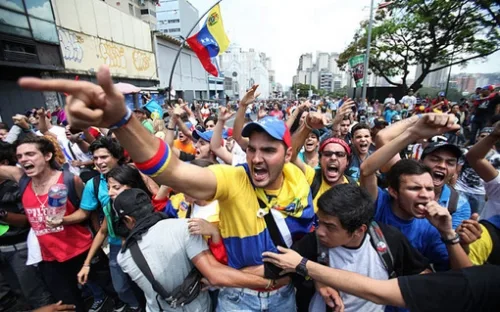Civil liberties and political rights continue to decline world-wide according to Freedom House’s annual Freedom in the World Study
For the ninth consecutive year, the number of countries worldwide where freedom has declined (61) is almost twice those where levels of liberty increased (33).
This was the key finding of the annual Freedom in the World study published on January 28 by Freedom House, analyzing the civil liberties and political rights available to citizens in 195 states in 2014.
Forty six percent (89) of the nations studied were classified as free, 28 percent (55) as partially free, and the remaining 26 percent (51) were classified as “not free.” The report, subtitled “Discarding Democracy: Return to the Iron Fist,” rates the countries on a scale of 1 to 7, 1 being the highest score.
The worst cases were found in the Middle East and Africa (including Syria, Equatorial Guinea, Saudi Arabia, Sudan, among others), as well as North Korea.
The decline in global freedom was largely due to increased state surveillance and control of the individual, coupled with restrictions on communication on the internet, particularly in authoritarian regimes.
The report concludes that strengthening democratic institutions is the key to freedom in any country. Antidemocratic tendencies often contribute to humanitarian crises, the authors found, and they also enable terrorist groups to flourish, which can have knock-on effects on the international community.
“Will established democracies recognize that global assaults on free institutions represent a threat to their national interests,” the study asked, “exemplified by the actions of the United States and the European Union against Russia when it invaded Ukraine?”
The study also condemned the international community’s failure to protest against human-rights violations allegedly committed by the Venezuelan government.
“Indeed, acceptance of democracy as the world’s dominant form of government — and of an international system built on democratic ideals — is under greater threat than at any point in the last 25 years,” expressed Arch Puddington, vice president of research, in a press release.
Puddington added that in the past, authoritarian regimes would claim to respect international conventions and support democratic elections and human rights. But the academic said that such regimes are currently pushing for a single-party system, looking for ways to eliminate the international and domestic checks and balances that limit them.
AMERICA: CONTINENTS OF CONTRADICTIONS
On December 17, 201, Barack Obama and Raúl Castro announced their intentions to resume diplomatic relations between the United States and Cuba after more than 50 years. But the event scarcely marked a turning point for freedom in the Americas, even if Cuba’s freedom ranking did improve slightly thanks to growth of the free press.
Instead, lack of respect for human rights in Mexico (3.0) and the United States (1.0) both saw a marked decrease in civil liberties, with the cases of Ayotzinapa, Iguala, and Ferguson, Missouri as prominent examples.
Venezuela (5.0) was similarly “partially free,” and in 2014 was characterized as having a repressive government during the student protests of last February and March.
Examples of government repression included state security forces using violence against protesters, arresting political dissidents, and a lack of due process and respect for the human rights of those arrested. According to the Venezuelan Program for Education and Action in Human Rights, that number was more than 3,100 (Provea).
The study also labelled Ecuador (3.0) as a partially free country, citing several high-profile attacks on free press in the Andean country — including a new law restricting the media and encouraging the harassment of journalists.
El Salvador (2.5) stood out as an island of relative freedom, despite ongoing gang violence. Freedom House classified the Central-American country as a free country, citing strong freedom of the press, freedom of expression, strong and active civil society. Since El Salvador’s 1992 Peace Agreement, it has had as many progressive as conservative governments. El Salvador’s achievements were in clear contrast to Guatemala and Honduras, both with similar indexes for violence, which were rated as “partially free.”
CHILE AND VENEZUELA: DIVERGENT PATHS
The report explores how Latin-American freedom has changed in the past 20 years. Between 1995 and 2000, Chile‘s government became a full democracy, while Venezuela endured constitutional amendments at the hands of the recently elected President Hugo Chávez.
Twenty years later, both countries have diverged even further in terms of civil and political rights; Freedom House’s interactive chart allows readers to compare the trajectory of freedom in each country.
Since 2004, the Venezuelan government has had legal sanction to control radio and television content. Civil liberties have suffered, most markedly in the past year, including press freedom, the report noted, highlighting the risk of intimidation and violence that citizens face when protesting.
The presence of opposition voices in the media has also markedly declined. Problems arose last year when print media experienced problems in purchasing paper; the state controls the supply of paper and ink, as well as major printing houses.
On Tuesday, January 27, the Defense Ministry issued a resolution which permitted the armed forces to use firearms and lethal force in order to contain “disorder” and “support the legitimate authority.”
By contrast, freedom of expression in Chile is generally respected, according to Freedom House. There are no restrictions on access to the internet, and means of communication are private.
The Chilean Constitution guarantees these liberties, yet the topic of human rights abuses during the Pinochet dictatorship (1973-1990), and a large number of unsolved cases, still weigh heavily on the country. Freedom House also noted that economic liberty fell short in Chile, citing what it viewed as excessive regulation and price fixing between companies.
Credit: Freedeom House, https://freedomhouse.org





















